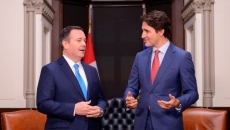The federal government is setting new guidelines that work national security considerations into funding criteria for university research.
Research projects must now undergo a risk assessment as part of any grant application to the Natural Sciences and Engineering Research Council of Canada (NSERC) that involves private-sector partners, Innovation Minister François-Philippe Champagne said Monday.
📣#NSERC and European Commission launch new joint call on #quantum technologies.
— NSERC / CRSNG (@NSERC_CRSNG) July 12, 2021
Details ▶️ https://t.co/Zem1nbkuey@EU_Commission #NSERCsupport #QuantumTechnology pic.twitter.com/9PsuKjj4FS
The research council will then assess and work to mitigate any risk alongside national security agencies and departments on a case-by-case basis, he said.
“The agencies will form a view, and for the partnerships that are deemed high risk, they will not be funded," Champagne said in an interview Monday, citing fields from aerospace to artificial intelligence and quantum computing.
The Canadian Security Intelligence Service and the Communications Security Establishment — the country's cyberspy agency — will play a key role in the risk assessment, he said.
Security questions around scientific research have drawn renewed attention after two scientists were escorted from the high-security National Microbiology Laboratory in Winnipeg in July 2019 and then fired in January this year.
One of the employees had earlier been responsible for a shipment of Ebola and Henipah viruses to China's Wuhan Institute of Virology, though the Public Health Agency of Canada has said that event is unrelated to their dismissal.
Champagne did not directly address the incident, which involved government employees rather than university researchers, but warned of “foreign interference or unwanted knowledge transfer that could contribute to the advancement of foreign militaries or other types of activities … which could harm the national security of Canada."
“The framework in play will certainly provide us with tools in order to better assess who our researchers are planning to partner with," Champagne said.
A working group composed of three federal departments, two security agencies and eight other organizations representing researchers and universities formed in 2018 — before the duo was escorted out of the Winnipeg lab — to promote practices that protect Canadian research data and intellectual property, he noted.
The working group helped develop the new criteria, dubbed the National Security Guidelines for Research Partnerships.
Champagne acknowledged that institutions have asked about the possibility of red-tape bottlenecks for researchers whose applications will funnel through intelligence services before receiving a stamp of approval.
The lead-up to the fresh framework, which has roots in workshops on research safeguards dating back to 2016, has helped clear a path for the current guidelines that will steer clear of backlogs, he said.
The Innovation Department plans to expand the new guidelines beyond NSERC's Alliance grant program to all granting councils and the Canada Foundation for Innovation "in the near term."<






